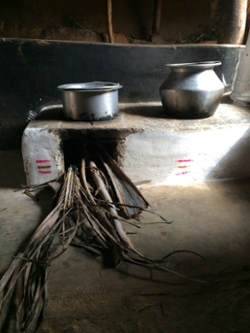Trial Methodology
The Household Air Pollution Intervention Network (HAPIN) was a randomized controlled trial of a liquefied petroleum gas (LPG) cookstove and fuel intervention in 3,200 households in four countries. HAPIN was launched in 2017, main enrollment started in 2018, and participant follow-up ended in 2021. The research team established trial sites in Guatemala, India, Peru, and Rwanda that each recruited 800 pregnant women, their 800 infants, and approximately 120 older adult women living in the same household into the study. Half of the participating households were randomly assigned to receive an LPG cookstove and fuel, and the other half served as controls using their customary (typically biomass) cooking practices. Participating households were followed for approximately 18 months, until the child's first birthday, with intensive monitoring of stove use and personal exposure to household air pollution, as well as extensive assessments of health outcomes. In children, health assessments included preterm birth, birth weight, growth, and respiratory infections. In adults, health assessments included respiratory function, blood pressure, inflammation, and other indicators of health disease.
For further information on the pre-specified outcomes of the trial, see the trial registration at ClinicalTrials.gov - NCT02944682. For a full description of the methods, overall study, biomarker, and exposure and stove use assessment protocol papers have all been published.
Multiple papers on study outcomes have also been published, including exposure reduction and three of the four primary outcomes: birth weight, stunting, and severe infant pneumonia. Secondary outcomes for children include preterm birth and childhood development. Secondary outcomes for pregnant women include abnormal maternal blood pressure during pregnancy, and for older adult women include impaired endothelial function, respiratory impairment, arteriosclerosis, carcinogenic metabolites, and reduced quality of life. See the Publications tab for all of the HAPIN manuscripts that have been published to-date.
Ongoing Work
Since research suggests that exposure to air pollution experienced during gestation and early life is linked to a range of longer-term health outcomes, and that the benefits of reduced exposures may continue even after the intervention ends, we received funding to continue to follow children at three of the research sites—Guatemala, India, and Rwanda—through age 5, to evaluate the effects of the original HAPIN intervention on neurologic and physical development.
The work builds on the major investment already made in the HAPIN trial by evaluating whether the benefits of the intervention extend beyond pregnancy and the child's first year of life. By leveraging a well-characterized cohort in three diverse settings, the work will provide rigorous and widely generalizable answers to questions important for both science and policy. We have maximized the potential for success by extending our prior research, using an experienced and proven research team with strong and ongoing relationships with participants. Visit the Extended Follow-up tab to learn more.
Involved Parties
The HAPIN trial was funded by the National Institutes of Health (NIH) in collaboration with the Bill & Melinda Gates Foundation. Participating NIH components included: the National Heart, Lung, and Blood Institute, the National Cancer Institute, the Eunice Kennedy Shriver National Institute of Child Health and Human Development, the National Institute of Environmental Health Sciences, the NIH Common Fund of the NIH Office of the Director, and the Fogarty International Center. The Global LPG Partnership provided expert advice to the consortium and an advisory committee consisting of Dr. Patrick Breysse, Dr. Donna Speigelman and Dr. Joel Kaufman provided valuable insight and guidance throughout trial implementation. A multi-disciplinary, independent Data and Safety Monitoring Board (DSMB) appointed by NHLBI monitored the quality of the data and protected the safety of participants enrolled in the study.
